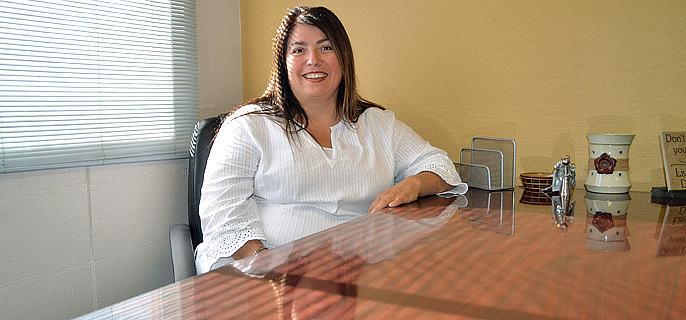[quote style=”2″]Counselor Opens Private Practice in Hermiston[/quote]
Nina Sobotta isn’t afraid of hard work. That, in part, explains why the full-time minority affairs officer with the Eastern Oregon Correctional Institution in Pendleton recently opened up a private counseling practice in Hermiston.
So each day, when she leaves her job at the Pendleton prison, she drives over to Hermiston and sees clients until well into the evening – including weekends.
“I’m a worker bee,” she said. “I was raised with a good work ethic.”
Counseling Made Solutions opened in March in the Lanham Building at 240 E. Gladys Ave., Suite 3, across from the Hermiston Public Library. The scope of her practice, as she put it, includes “a little bit of everything.”
Despite growing awareness of mental illness in recent years, Sobotta said it still carries a stigma that makes it difficult for some to seek treatment. That’s particularly true in the Hispanic culture, she said. Her father was a paranoid schizophrenic who went undiagnosed and unmedicated for years.
“In the Hispanic culture, it’s considered witchcraft,” she said. “The belief is somebody puts a curse on you.”
But the stigma of mental illness goes well beyond the Hispanic population. The biggest hurdle to treating the mentally ill, said Sobotta, is that there is nothing visible about its symptoms.
“You can see physical illness,” she said. “And through medical science, you can fix it. You can’t see mental illness.” And, depending upon the type of mental illness, particularly schizophrenia, the victims often cannot recognize they are ill.
“When you’re mentally ill, you often have no insight,” she said. “And without insight, you cannot admit you’re mentally ill.” Mental illness and psychological problems, however, are not confined to the castoffs of society – the homeless person arguing with himself on the sidewalk or alley way.
“The real meat and potatoes of it is everyone has problems,” Sobotta said. And, she added, those problems can develop into something more serious if left alone. She talks about the “worried well,” people without any mental health issues, but who can suddenly develop short-term depression due to a specific traumatic event.
Stress is a big trigger, she said.
“Stress can exacerbate mental illness,” Sobotta said. “And managing it is difficult and that’s where I hope my office can step in.” She said an individual’s mental health is no different than their physical health – it has to be maintained.
“It’s like eating right or exercising,” she said. “You have to take care of your mental health so you can be a functional, optimal human being. All of us have issues and when we decide to be pro-active about our issues, that’s when we become successful people.”
Along with her job at the prison and her private practice, for the past two years Sobotta has served as a volunteer with the Natural Disaster Medical Team which deploys personnel around the country during disasters. She has yet to be called to a disaster site, but was on the waiting list to go to New York during Hurricane Sandy. When deployed, her role would be to provide counseling to doctors and nurses treating the injured and who can be overwhelmed by the endless trauma they encounter.
Eventually she would like to focus her practice on treating people in high-stress jobs such as correctional officers and those in law enforcement. In the meantime, she has her hands full with her day job and private practice – and that’s just how she likes it.
“I work hard and I’m impatient when it comes to getting things done,” she said.
Her office hours are 4:45 to 8 p.m., Monday through Thursday, 3:30 to 8 p.m. on Fridays, and 9 a.m. to 3 p.m. on weekends. She can be reached at (541) 567-6112 or e-mail her at cmsolutions07@gmail.com.











